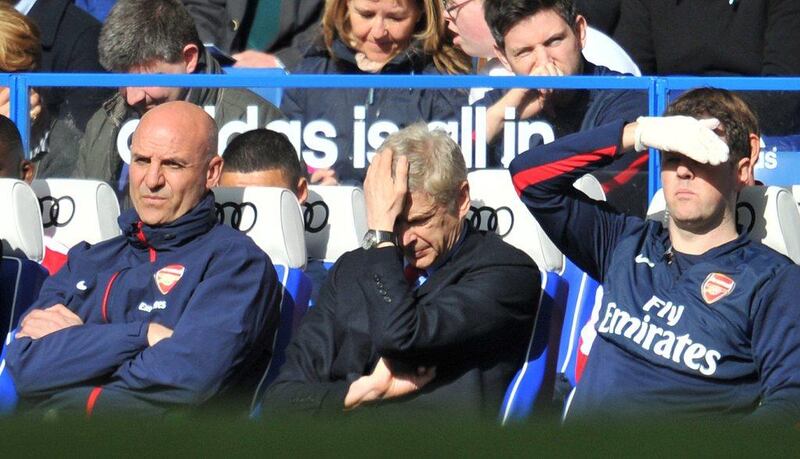Perhaps it was the strangest tribute of all. Arsene Wenger’s achievement in reaching 1,000 games as Arsenal manager brought many an accolade from his employers, players and rivals.
So the game’s authorities, considering Wenger’s well-known inability to see any incident that resulted in one of his players being sent off, appointed a referee who first did not spot Alex Oxlade-Chamberlain’s impromptu display of goalkeeping at Chelsea and, when alerted to it, did not identify the correct culprit and dismissed Kieran Gibbs instead.
It was a masterpiece of myopia that has made referee Andre Marriner the butt of many a joke.
The serious element, though, is that Arsenal, beaten 6-0 by Chelsea on Saturday, were condemned to the joint heaviest defeat of Wenger’s reign and that, somewhere in between Samuel Eto’o opening the scoring and Eden Hazard converting the penalty that the bemused Gibbs was wrongly deemed to have conceded, their title hopes disappeared.
Whether the eventual champions are Chelsea, Liverpool or Manchester City, it seems safe to say that, for the 10th consecutive season, they will not be Arsenal.
At least, for the first time in three years, Arsenal have participated in the title race.
Yet the logical interpretation is that the clear-the-air talks they held on Sunday were not just about one defeat, demoralising and deeply embarrassing as it was.
In any analysis of where Arsenal’s challenge foundered, three games stand out: the 6-3 loss at City, the 5-1 evisceration by Liverpool and the 6-0 demolition at Chelsea’s hands.
Improbably, Arsenal have conceded as many goals on those three days as in their other 27 league matches.
It is worth pointing out that Arsenal acquitted themselves commendably in many high-pressure games this season.
Yet those thrashings have common denominators, besides being early kick-offs on Saturdays. Liverpool and Chelsea were particularly adept at breaking quickly and catching Arsenal with too many men upfield.
A tendency for both full-backs to venture forward together has cost the Gunners before. It has not been addressed and it can leave the central defenders exposed.
It is compounded whenever Wenger starts without a specialist defensive midfielder. He erred by naming Mathieu Flamini on the bench on Saturday and opting for Mikel Arteta, an essentially constructive player, in a position where Arsenal can require a destructive presence.
The Spaniard tries to compensate but it is telling that, lacking pace and with a propensity to resort to illegal methods, he was sent off away at Napoli and risked receiving red cards on Arsenal’s other most demanding trips in the Uefa Champions League, against Borussia Dortmund and Bayern Munich. Relying on him is a dangerous policy.
Football has become more open since Wenger won the last of his three titles but it is instructive that they came with Patrick Vieira, accompanied by first Emmanuel Petit and then Gilberto Silva, erecting an iron barrier in front of the back four.
Now Per Mertesacker and Laurent Koscielny merit their billing as one of England’s foremost defensive pairings – perhaps only the Chelsea duo of John Terry and Gary Cahill have been better – but, if only on a handful of occasions every season, Arsenal need to shield them better.
A defensive structure is necessary, especially on their travels. There is a marked contrast between Jose Mourinho’s Chelsea, who have kept clean sheets at Old Trafford, the Emirates Stadium and the Etihad Stadium, and Wenger’s Arsenal, who have leaked 17 goals in three league visits to the rest of the top four. They have been left looking naive.
Wenger’s purism has long attracted criticism from the pragmatists. Their argument is that games, let alone trophies, are decided in either penalty box.
The Frenchman recognised as much in his pursuit of a superstar striker last summer. Had Arsenal’s much-discussed bid of £40 million (Dh242.2m) plus £1 for Luis Suarez succeeded last summer, we might now be acclaiming it as a catalytic deal that returned the Gunners to the summit of the English game.
Liverpool’s refusal to sell has changed the course of two clubs’ seasons.
Yet though those funds were eventually spent on Mesut Ozil, Wenger may regret his reluctance to push through a move for Gonzalo Higuain.
Another goalscorer was what Arsenal really required, despite Olivier Giroud’s valiant efforts to compensate.
A second failure to sign a striker in January came at a cost and the damning fact is that Arsenal’s specialist centre-forwards have only contributed one league goal against top-seven sides this season.
But the other reason Arsenal will not win the league is beyond their control. They have had more injuries than their immediate rivals.
Aaron Ramsey was headed for a place on the shortlist for the player-of-the-year awards but has not been fit enough to take the field in 2014. Theo Walcott’s campaign is over after just nine league starts. Oxlade-Chamberlain, who was out for almost five months, has only begun five games. Jack Wilshere and Ozil are sidelined now. It amounts to a litany of bad luck.
Where Arsenal can reflect on their own failings is in the transfer market and in their tactical set-up in three key away games.
They explain why Wenger will not be seen parading the Premier League trophy in May – and not just by the sadly short-sighted Marriner.
sports@thenational.ae
Follow us on Twitter @SprtNationalUAE






